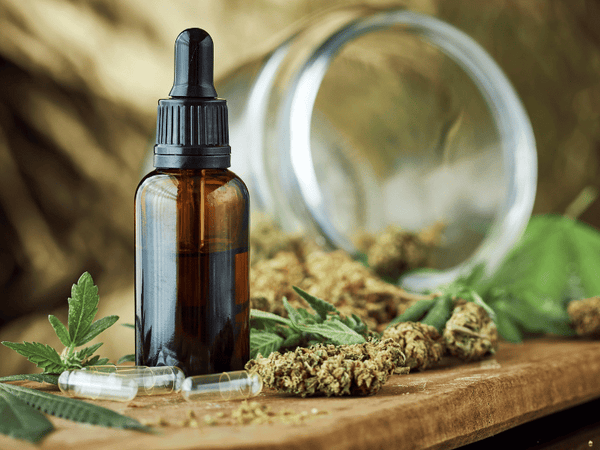The world of cannabis is rich and complex, with its myriad compounds sparking curiosity, debate, and research. Among these, tetrahydrocannabinol (THC) stands out as the most renowned for its psychoactive properties, often associated with the "high" experienced by marijuana users. But beyond the recreational and medicinal uses lies a question that puzzles many: Is THC a depressant?
Depressants, by definition, are substances that reduce arousal and stimulation in the body, affecting the central nervous system and slowing down brain function. This category includes a range of substances, from alcohol to sedatives. Given that THC has multifaceted side effects on the human body and mind, classifying it strictly as a depressant oversimplifies its complex nature. This article aims to delve into the intricacies of THC, exploring its various side effects, comparing it with known depressants, and shedding light on its categorization.
What is THC?

Overview of THC
Tetrahydrocannabinol, commonly referred to as THC, is the primary psychoactive compound found in the cannabis plant. It's responsible for the majority of the psychological effects that users experience when consuming marijuana. Marijuana (also known as weed or pot) refers to the dried flower, leaves, and seeds of the cannabis sativa plant.
Weeding can have a variety of physical and psychological effects that vary from person to person. It can make some people feel relaxed or tired, give others an energy boost, and make them feel alert. It can also help to cure mental health conditions, such as anxiety and depression, in some people. It may also cause a high or euphoric feeling by stimulating the brain to release dopamine.
By interacting with the body's endocannabinoid system, THC binds to cannabinoid receptors in the brain and affects various mental and physical processes. These side effects can include altered perceptions, euphoria, relaxation, and an increased appetite, among others. The potency and impact of THC can vary significantly depending on the strain of cannabis and the method of consumption.
THC vs. CBD
While marijuana, THC, is often the drug spotlighted in drug shows for its psychoactive drug qualities, cannabidiol (CBD), another prominent compound found in cannabis, has gained widespread attention in drug shows for its potential therapeutic benefits without the intoxicating psychoactive drug effects of marijuana. Unlike THC, CBD does not produce a high, making it an appealing option for those seeking prescription painkillers, anxiety, and other conditions without the same psychoactive drug side effects as marijuana.
The primary distinction between THC and CBD lies in their interaction with the endocannabinoid system. THC binds strongly to CB1 receptors in the brain, resulting in the well-known high, whereas CBD has a more indirect influence on these receptors, often modulating THC's effects and contributing to the plant's therapeutic potential.
Alive Market 1:1 CBD+THC Gummies
 Alive Market's 1:1 THC/CBD gummies offer a balanced approach to cannabis consumption, ensuring a harmonious experience that steers clear of the feelings of depression often associated with THC-dominant products. The unique ratio of THC to CBD works to create a synergistic effect, leveraging the therapeutic benefits of both cannabinoids. CBD, known for its anxiety-reducing and anti-inflammatory properties, counteracts the potential anxiety and paranoia that THC can induce in some individuals, promoting a more relaxed and uplifting experience.
Alive Market's 1:1 THC/CBD gummies offer a balanced approach to cannabis consumption, ensuring a harmonious experience that steers clear of the feelings of depression often associated with THC-dominant products. The unique ratio of THC to CBD works to create a synergistic effect, leveraging the therapeutic benefits of both cannabinoids. CBD, known for its anxiety-reducing and anti-inflammatory properties, counteracts the potential anxiety and paranoia that THC can induce in some individuals, promoting a more relaxed and uplifting experience.
Moreover, Alive Market understands that individual responses to cannabinoids vary greatly, which is why they emphasize that their product is not a one-size-fits-all solution. The 1:1 ratio offers a middle ground, appealing to those who seek the medicinal benefits of THC without the overwhelming psychoactive effects. This careful balance allows users to fine-tune their experience based on personal tolerance, desired effects, and specific health needs, ensuring a personalized approach to cannabis consumption.
By acknowledging the unique body chemistry of each individual, Alive Market's 1:1 THC/CBD gummies provide a versatile option for both seasoned cannabis users and newcomers alike, aiming for a positive and controlled experience without the risk of unwanted side effects like depression.
Understanding Depressants

Definition of a Depressant
Depressants are a class of drugs that inhibit the function of nerve cells of the central nervous system (CNS) and decrease neuronal activity, leading to a reduction in arousal, stimulation, and various physical and psychological functions.
What is a depressant drug? Depressants are drugs that slow down your brain function. Some examples are alcohol, Xanax, and barbiturates. Stimulants: These elevate your mood and increase your energy and alertness. They tend to be highly addictive. Examples are cocaine, methamphetamine, and prescription drugs for ADHD. Many depressant drugs are prescribed to relieve the symptoms of anxiety disorders before medical procedures or as part of treatment for sleep disorders.
However, depressants can also have negative short-term effects, such as other symptoms such as nausea, confusion, reduced motor skills and coordination, low blood pressure, slowed breathing, slurred speech, lightheadedness, blurred vision, short-term memory loss, and dizziness.
Examples of Depressants
Common substances classified as depressants include alcohol, benzodiazepines (such as Valium and Xanax), barbiturates, and certain sleep medications. These substances vary in their strength, duration of action, and the specific effects they have on the body and brain. For instance, benzodiazepines are often prescribed for anxiety due to their sedative properties, while barbiturate drugs may be used in the treatment of more severe cases of insomnia or seizure disorders.
Depressants work by enhancing the activity of gamma-aminobutyric acid (GABA), a neurotransmitter that promotes relaxation and reduces nerve activity. By increasing GABA's inhibitory effects, depressants help to calm the nervous system, leading to the desired therapeutic outcomes. However, misuse of depressant drugs, drug abuse, chronic use of stimulant stimulants, depressant effects of drug abuse, or overuse of depressants can lead to dependence, tolerance, and significant health risks, underscoring the importance of using these substances under medical supervision.
Understanding the role and effects of depressants is crucial when examining THC's impact and its potential classification as a depressant. By comparing THC's depressant effects to those of traditional depressants, we can gain insights into its complex nature, how it interacts with other drugs, and how the effects begin the body's physiological and psychological processes.
The Effects of THC on the Body
-
Psychoactive Effects of THC

THC is best known as one of the psychoactive drugs that can significantly alter a user's mood-elevating effects, consciousness, and perception of reality. Upon consumption, THC binds to cannabinoid receptors in the brain, particularly in areas associated with memory, pleasure, thinking, coordination, and time perception.
This interaction results in the well-documented "high" associated with the use and abuse of cannabis, characterized by euphoria, heightened sensory perception resulting in them seeing brighter colors, hearing sounds differently, being more sensitive to touch, and, in some cases, increased anxiety or paranoia. The intensity and nature of these effects can vary based on the dose, method of consumption, and individual user characteristics.
- Physical Effects of THC

Beyond its psychoactive impacts, THC also has a variety of effects on the physical body. It can act as a bronchodilator, expanding the airways and potentially aiding in respiratory conditions. THC may also increase heart rate, reduce intraocular pressure (beneficial for glaucoma patients), increase alertness, and induce relaxation of the muscles. However, it's important to note that THC's effects on appetite stimulation, known colloquially as "the munchies," highlight its ability to influence bodily functions beyond the central nervous system.
THC's Stimulant and Hallucinogenic Properties
While the question often revolves around whether THC is a depressant, its effects are not limited to a single pharmacological category. In low doses, THC can exhibit qualities of stimulants, as evidenced by increased heart rate and euphoria, and in higher doses, it may have hallucinogenic properties, leading to an altered sense of perception and, in rare cases, delusions or hallucinogen effects. Stimulants produce the opposite effect that causes physical symptoms, typically increasing the blood pressure, pulse, and breathing rate. While hallucinations are possible, they happen rarely and don't occur in all users. But the symptoms of weed, such as time distortion, are also part of a hallucination.
Hallucinogens are a type of drug that alters your person's perception and immune system of reality by changing the way the nerve cells in your brain communicate with each other. Keep in mind that hallucinations and paranoia, which are associated with stimulants, are different things. Incorrect impressions of objects, events, elevated moods, or senses are what constitute hallucinations, whereas incorrect ideas that are typically accompanied by mistrust are what constitute paranoia.
Is THC considered a depressant?
Navigating the intricate landscape of THC's effects reveals a substance that defies simple classification. While certain aspects of THC's impact on the body align with depressant characteristics, its comprehensive profile spans stimulant and hallucinogenic territories as well. This section aims to dissect THC's depressant qualities, contrast them with other depressants, and embrace the complexity of its pharmacological identity.
Analysis of THC's Depressant Qualities
THC shares some common ground with depressants through its ability to induce relaxation, decrease anxiety in some individuals, and reduce seizure activity in specific cases. Like traditional depressants, THC can slow down some functions of the central nervous system, as evidenced by its muscle relaxant properties and potential to lower aggression in certain scenarios.
Comparison with Other Depressants
When compared to classic depressants like alcohol, benzodiazepines, or barbiturates, THC's effects are markedly different. For example, alcohol and benzodiazepines enhance activity, leading to a pronounced depressant effect on the central nervous system. The central nervous system is made up of the brain and spinal cord. It is a complex network of nerves and cells called neurons that send signals or messages to different parts of the body.
The Complex Nature of THC

The complexity of THC's effects stems from its interaction with other substances in the endocannabinoid system (ECS), a critical modulatory system in the human body. The ECS plays a vital role in regulating a plethora of physiological processes, including mood, memory, appetite, and pain sensation. THC's ability to both activate and inhibit various components of the ECS explains its diverse outcomes, the same effects of which can fluctuate dramatically between individuals based on genetic makeup, tolerance levels, and other factors.
Understanding THC's broad spectrum of effects is crucial for both marijuana users and healthcare professionals. It underscores the importance of approaching cannabis use with mindfulness and respect for its potent, varied impacts on the human body and mind. As research continues to unravel the complexities of marijuana-addictive THC and the brain function of the endocannabinoid system, the categorization of THC may evolve, reflecting a greater risk and a more nuanced appreciation of marijuana's highly addictive and multifaceted nature.
Conclusion
Classifying marijuana and THC strictly as depressants does not capture the full extent of marijuana's effects and its effects on the human body and mind. While it shares certain characteristics with depressants, its ability to also act as a stimulant and produce hallucinogenic effects highlights the complexity of cannabis and its main psychoactive compound. This complexity necessitates a careful, informed approach to cannabis consumption, recognizing the potential for varied responses and the importance of individualized consideration in using marijuana in both recreational and medicinal contexts.
As we move forward, the conversation about THC, cannabinoid chemicals, weed use, its classification, and its place in both the medical and recreational marijuana use landscapes will undoubtedly continue to evolve. By embracing the complexity of THC and other chemicals in weed use and seeking to understand their multifaceted impact, we can navigate their use more responsibly and effectively, maximizing their potential benefits while minimizing risks.
FAQs
Is THC considered a depressant, a stimulant, or a hallucinogen?
Marijuana users may also experience the typical side effects of depressants, stimulants, and hallucinogenic drugs. It can induce relaxation and decrease anxiety (depressant-like effects), increase heart rate and euphoria (stimulant-like effects), and, in higher doses, cause altered perception (hallucinogenic effects).
Can THC help with anxiety or depression?
THC may help reduce symptoms of anxiety or depression for some users by inducing feelings of euphoria and relaxation. However, it can also exacerbate these conditions in others, especially at high doses or in individuals with a predisposition to mental health disorders. It's important to consult with a healthcare provider before using THC for anxiety or depression.
Is it safe to use THC?
While many people use THC safely, it can pose risks, especially when consumed in high doses or by individuals with certain medical conditions or predispositions, to treat mental health conditions or issues. Potential side effects include impaired memory, coordination issues, increased heart rate, and paranoia. Long term or heavy use can lead to dependence or other mental health conditions or issues. It can also cause a relapse of schizophrenic symptoms.
How does THC compare to CBD?
THC and CBD are both compounds found in cannabis or marijuana, but they have different effects. THC is psychoactive, causing the "high" associated with marijuana use, while CBD is not intoxicating and is often used for its potential therapeutic benefits without the psychoactive effects of marijuana.
Can using THC lead to marijuana addiction?
Yes, chronic use of THC can lead to cannabis use disorder, characterized by dependence and withdrawal symptoms upon cessation. The risk of marijuana addiction and marijuana use disorder varies among individuals and is influenced by factors such as genetics, the frequency of marijuana use disorder itself, and the potency of the THC product consumed. Using marijuana regularly can lead to problem use, such as marijuana use disorder.
How long do the effects of THC last?
The duration of THC's effects depends on several factors, including the method of consumption (smoking, vaping, edibles, etc.), the dose, and individual differences in metabolism and tolerance. Effects can last from 1 to 3 hours when inhaled to up to 8 hours or more when consumed in edible form.
Can THC be used medicinally?
Yes, THC has several medical marijuana applications, including pain relief, nausea control, and appetite stimulation, particularly in patients undergoing chemotherapy or with AIDS. Medical marijuana and cannabis laws vary by country and state, so it's important to consult local marijuana regulations and a healthcare provider when considering THC for medical marijuana use.
Can THC cause panic attacks?
Yes, THC can cause panic attacks in some individuals. While THC is known for its psychoactive effects, including relaxation and euphoria, it can also lead to less desirable outcomes such as anxiety and paranoia, particularly in sensitive individuals or when consumed in high doses.


